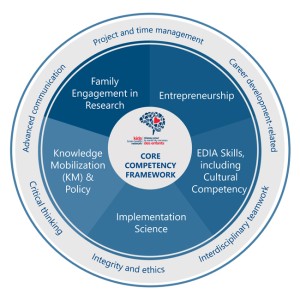The Kids Brain Health Network (KBHN) National Training Program brings together people from across Canada who are working, studying or advocating to improve the lives of children with neurodevelopmental disabilities (NDDs), their families and caregivers. Our program also includes people who are interested in evidence-based training to support them in these endeavours.
Kids Brain Health Network (KBHN) National Training Program
KBHN’s National Training Program is unique because we include people with lived experience of NDDs, their family members and caregivers, as well as community members and partner organizations in our nationwide Network. We open doors to welcome and learn from the people with neurodevelopmental disabilities who we are supporting, who inform our studies and research—and who experience the impacts of our combined efforts.
Who Can Join the KBHN National Training Program?
Undergraduate and graduate students, postdoctoral fellows and research associates can apply to become trainees through the KBHN National Training Program. We offer training opportunities beyond the lab and in the community, for people studying and doing research across all disciplines related to neurodevelopmental disabilities including Autism, cerebral palsy, Down Syndrome, and Fetal Alcohol Syndrome Disorder (FASD), and many more.
 |
The Kids Brain Health Network National Training Program has empowered me to make a difference in the lives of neurodiverse families, equipping me with skills, knowledge, and a network of like-minded individuals dedicated to this cause.” ~ Jeffrey McCrossin, Ph.D. Candidate (School of Social Work, McGill University) |
What is the KBHN National Training Program?
The KBHN National Training Program creates a learning culture that encourages the next generation of Canadian researchers to translate new knowledge into better outcomes for children with neurodevelopmental disabilities, their caregivers, and families.
Through partnerships with organizations across Canada, Kids Brain Health Network offers unique learning opportunities that go beyond traditional training experiences offered in academia. We are the only national program in developmental neurosciences in Canada, supporting curriculum and practical experiences that advance trainees on both academic and non-academic career paths. Our trainees move on to careers as professors, science administrators, researchers, and biomedical and health sector professionals to name a few.
What are the Benefits of Participating in the KBHN National Training Program?
KBHN trainees and alumni contribute to Canada’s economic growth and prosperity across multiple sectors, including academia, industry, health care and government. Our research shows that, as of 2022:
- 71 former trainees occupying positions internationally.
- 61 former KBHN trainees hold faculty positions at universities and research institutes in Canada (46) and internationally (15), and 9 of these individuals are principal investigators or co-investigators on currently-funded KBHN projects.
- 114 former KBHN trainees have moved into positions in industry.
- 150 former KBHN trainees are working as health care/hospital professionals.
In 2022-2023, KBHN enabled training of 207 Highly Qualified Personnel (HQP), beyond the lab and clinic by engaging with community partners, and providing first-hand experience with youth and families. There were 84 new trainees, consisting of 19 research associates, 15 postdoctoral fellows, 37 doctoral students, 23 master’s students, 27 undergraduates and 86 additional technical/professional staff.
Participate in the KBHN National Training Program
We offer many types of opportunities to participate in the KBHN National Training Program, including:
- Hands-on experiences in our research and implementation projects
- Professional development webinars and workshops
- Awards, scholarships, and paid internships
- Networking, learning, and presentation opportunities at the KBHN Annual Conference
To learn more about upcoming opportunities, please subscribe to our newsletter and follow us on X / Twitter and Instagram.
KBHN Core Competency Framework
 The National Training Program spans five competency areas that are foundational to our vision and mission:
The National Training Program spans five competency areas that are foundational to our vision and mission:
- Family engagement in research
- Entrepreneurship
- EDIA Skills (Equity, Diversity, Inclusion & Accessibility), including Cultural Competency
- Implementation of Science
- Knowledge Mobilization (KM) & Policy
Skills
The framework also contains six cross-cutting skills that are integrated into each KBHN trainee’s learning experience:
- Advanced communication
- Project and time management
- Career development-related skills
- Critical thinking
- Integrity and ethics
- Collaboration and interdisciplinary teamwork.
https://kidsbrainhealth.ca/wp-content/uploads/2023/10/05_AwardsScholarships_NavDev_315px-166px.jpg
Awards & Scholarships
https://kidsbrainhealth.ca/wp-content/uploads/2023/12/Training-Career_Development_sub-section_nav_315px-166px.jpg
Training & Career Development
https://kidsbrainhealth.ca/wp-content/uploads/2023/12/Webinars-Workshops_sub-section_nav_315px-166px.jpg
Webinars & Workshops
Contact Us
If you have any questions about the KBHN National Training Program, or if you want to learn more, we’d love to hear from you. Please contact training@kidsbrainhealth.ca.